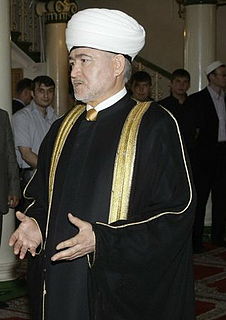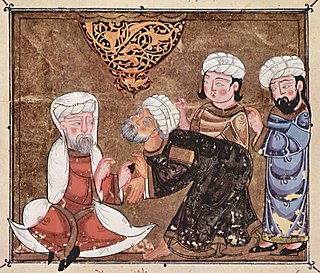
A krai is a type of federal subject of Russia. The country is divided into 85 federal subjects, of which nine are krais. Oblasts, another type of federal subject, are legally identical to krais and the difference between a political entity with the name "krai" or "oblast" is purely traditional, similar to the commonwealths in the United States; both are constituent entities equivalent in legal status in Russia with representation in the Federation Council. During the Soviet era, the autonomous oblasts could be subordinated to republics or krais, but not to oblasts.

Islam in Russia is the nation's second most widely professed religion. According to a nationwide survey conducted in 2012, Muslims in Russia numbered 9,400,000 or 6.5% of the total population. However, the populations of two federal subjects with Islamic majorities were not surveyed due to social unrest, which together had a population of nearly 2 million, namely Chechnya and Ingushetia, thus the total number of Muslims may be larger. Among these Muslims, 6,700,000 or 4.6% of the total population of Russia were not affiliated with any Islamic schools and branches. Recognized under the law and by Russian political leaders as one of Russia's traditional religions, Islam is a part of Russian historical heritage, and is subsidized by the Russian government. The position of Islam as a major Russian religion, alongside Orthodox Christianity, dates from the time of Catherine the Great, who sponsored Islamic clerics and scholarship through the Orenburg Assembly.

Islam is the largest religion practiced in Kazakhstan, with estimates of between 47% to 70.2% of the country's population being Muslim. Ethnic Kazakhs are predominantly Sunni Muslims of the Hanafi school. There are also small number of Shia and few Ahmadi. Geographically speaking, Kazakhstan is the northernmost Muslim-majority country in the world. Kazakhs make up over half of the total population, and other ethnic groups of Muslim background include Uzbeks, Uyghurs and Tatars. Islam first arrived on the southern edges of the region in the 8th century from Arabs.

Islam in Bulgaria is a minority religion and the largest religion in the country after Christianity. According to the 2011 Census, the total number of Muslims in Bulgaria stood at 577,139, corresponding to 7.8% of the population. According to a 2017 estimate, Muslims make up 15% of the population. Ethnically, Muslims in Bulgaria are Turks, Bulgarians and Roma, living mainly in parts of northeastern Bulgaria and in the Rhodope Mountains.

Romania's administration is relatively centralized and administrative subdivisions are therefore fairly simplified.

Soviet Border Troops were the militarized border guard of the Soviet Union, subordinated to its subsequently reorganized state security agency: first to Cheka/OGPU, then to NKVD/MGB and, finally, to KGB. Accordingly, they were known as NKVD Border Troops and KGB Border Troops. Unlike border guards of many other countries, Soviet Border Troops also included the maritime border guarding units.

Rawil Gaynutdin ; born on August 25, 1959 in the village of Shali of Pestrechinsky District of the Tatar ASSR, Soviet Union to a Volga Tatar family. He has served as the Grand Mufti of Russia since July 1, 1996. He is one of the signatories of A Common Word Between Us and You, an open letter by Islamic scholars to Christian leaders, calling for peace and understanding.

A muḥtasib was a supervisor of bazaars and trade in the medieval Islamic countries. His duty was to ensure that public business was conducted in accordance with the law of sharia.

The Spiritual Administration of the Muslims of Central Asia and Kazakhstan (SADUM) was the official governing body for Islamic activities in the five Central Asian republics of the Soviet Union. Under strict state control, SADUM was charged with training clergy and publishing spiritual materials, among other tasks. The organization was headquartered in Tashkent, Uzbekistan. Established in 1943, SADUM existed for nearly 50 years. With the dissolution of the Soviet Union, the five newly independent republics reformed their respective branches of SADUM into their own national Islamic institutions.
Sheikh Muhammad Sadik Muhammad Yusuf was born in the region of Andijan (vilayah) on April 15, 1952 and died on 10 March 2015. He was the son of Muhammad-Yusuf qori, who was the son of Muhammad-Ali scholar Andijani. He was the mufti of the Spiritual Administration of the Muslims of Central Asia and Kazakhstan. He was Uzbekistan’s first mufti after independence. Muhammad Sodiq was a member of a number of Islamic Institutions, including the International Union of Muslim Scholars (IUMS), a non-governmental organization of Islamic scholars.
Territorial nationalism describes a form of nationalism based on the belief that all inhabitants of a particular territory should share a common national identity, regardless of their ethnic, linguistic, religious, cultural and other differences. Depending on the political or administrative status of a particular territory, territorial nationalism can be manifested on two basic levels, as territorial nationalism of distinctive sovereign states, or territorial nationalism of distinctive sub-sovereign regions.

The Orenburg Muslim Spiritual Assembly was a state-controlled religious administration in the Russian Empire that had jurisdiction over certain aspects of Islamic activity in Siberia, the Volga-Ural region, and parts of Central Asia, including the Kazakh steppe. It was established in 1788 by order of Russian Empress Catherine II.
A muftiate Bosnian: Muftijstvo or Muftiluk; Albanian: Myftini; Bulgarian: мюфтийство; Kazakh: мүфтият; Russian: Муфтият; Tatar: мөфтият; Romanian: muftiat; Ukrainian: Муфтіят) is an administrative territorial entity under the supervision of a mufti.
Mufti Amjad Ali Aazmi, also known as Sadr-ush-Shariah Badr-e-Tariqat was an Islamic jurist, writer and former Grand Mufti and Qadi of India. Mufti Amjad Ali was born in 1882, in the Mohalla Karimuddin Pur, Ghosi, Mau district, Uttar Pradesh, India. His Father name Hakim Jamal al-din. His father and grandfather both were renowned scholars in religious theology and expert specialists in the “Unani” (Greek) system of medicine.
Sadwaqas Ghylmani was a long-serving qadi of Kazakhstan, imam-khatib and member of Muslim Council for Central Asia and Kazakhstan.
A muhtasibat is an Islamic territorial division of a muhtasib and is directly subordinate to a qadi and qadiyat. A muhtasib oversees a muhtasibat.
The 100th Rifle Division was an infantry division of the Soviet Union's Red Army during World War II, formed twice.

Islamic Leadership in Jerusalem refers to the leading cleric (ulema) of the Muslim community in Jerusalem. Historically, the primary religious leader was the Qadi. During the late Ottoman Empire, the Muftis became pre-eminent, particularly the Mufti of the Hanafi school, and during the British military administration the post of Grand Mufti of Jerusalem was created, which continues today.












